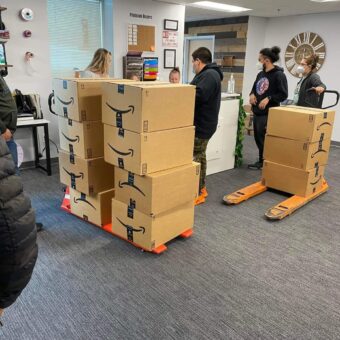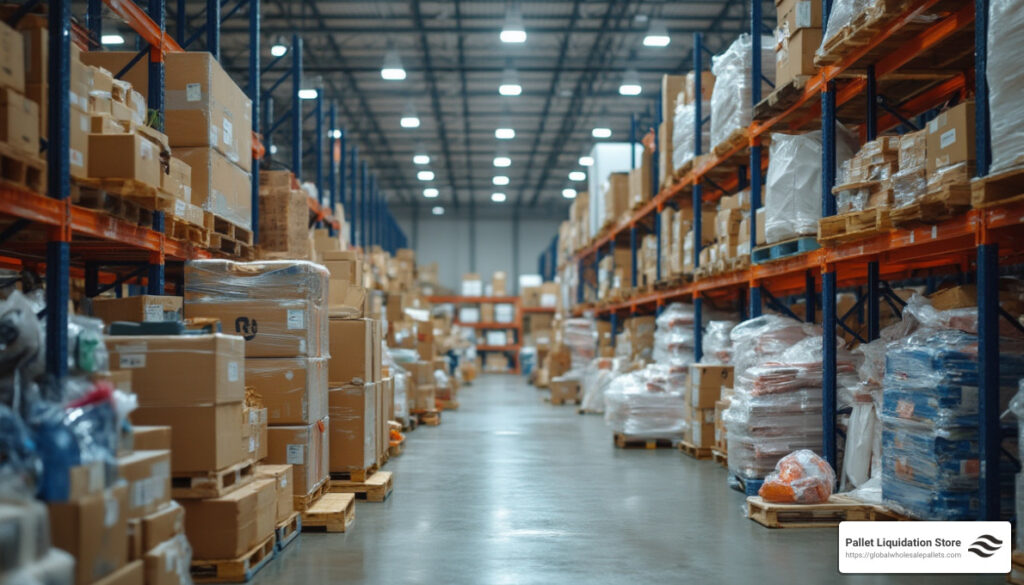Liquidation pallet: a term that might conjure images of dusty warehouses but is actually a guide for savvy resellers seeking high returns on low investments. These pallets are collections of excess or returned goods bundled together and sold at deep discounts. For small business owners, they offer a chance to buy inventory cheaply and resell for a profit. By picking the right pallets, you can find yourself with a treasure trove of items ready to move at appealing price points.
- Why choose liquidation pallets?
- Affordable Inventory: Low input costs make high profit margins achievable.
- Diverse Stock: From electronics to home goods, there’s something for everyone.
- Resale Opportunities: Perfect for online or physical stores.
Buying liquidation pallets can transform your business, bringing rich variety and quality products without the steep costs. But it takes some skill to steer this landscape wisely. As Randall T. shares in reselling, “With each pallet, there’s a chance to turn what was unwanted into something everybody wants.”

Understanding Liquidation Pallets
Liquidation pallets are a game-changer in the retail and wholesale industries. They consist of unsold merchandise, customer returns, or excess inventory bundled together and sold at a discount. These pallets can contain a wide variety of products, from electronics and clothing to home goods and seasonal items.
Amazon Return Pallets
One type of liquidation pallet that has gained popularity is the Amazon return pallet. When customers return items to Amazon, these products often end up in liquidation pallets. This happens because it’s more cost-effective for Amazon to sell the returns in bulk rather than restocking them individually. These pallets can include anything from electronics to apparel, making them a treasure trove for resellers.

Wholesale Liquidation
The process of wholesale liquidation involves purchasing these pallets in large quantities, often through online platforms or liquidation auctions. This approach allows retailers to clear out surplus stock quickly and efficiently. For small businesses and entrepreneurs, this means an opportunity to buy products at a fraction of their retail value.
- Key Benefits of Wholesale Liquidation:
- Cost Savings: Purchase products at a significantly reduced price.
- Variety: Access to a wide range of goods, from electronics to home essentials.
- Profit Potential: Resell items at competitive prices for a profit.
Navigating the Liquidation Market
To succeed in the liquidation market, it’s crucial to understand the dynamics and make informed decisions. Not all pallets are created equal, and the condition of items can vary. Some pallets might contain open-box returns, which are often in excellent condition, while others might have salvage items that require repairs.
Tip: Always research and choose reputable sellers or platforms. Look for reviews and ratings to ensure you’re getting quality merchandise.
By understanding the ins and outs of liquidation pallets, you can open up a world of opportunities for your reselling business. Whether you’re sourcing Amazon return pallets or diving into wholesale liquidation, the key is to stay informed and strategic.
How to Source Liquidation Pallets
Sourcing liquidation pallets can be a lucrative venture if you know where and how to start. Here’s a simple guide to help you steer the process.
Online Liquidation Platforms
The internet is your best friend when it comes to finding liquidation pallets. Several online liquidation platforms specialize in selling these pallets. These platforms, like B-Stock, partner with major retailers such as Walgreens, Amazon, and Walmart to sell overstock and returned items.
- Popular Platforms Include:
- B-Stock
- Quicklotz
- Liquidation.com
Each platform offers a variety of categories, from electronics to home goods, and even Amazon return pallets. They often have auction-style listings where you can bid on pallets or purchase them outright.
Registration Process
Before you can start buying, you’ll need to register on these platforms. The registration process is straightforward but requires some important information:
- Create an Account: Provide basic details like your name and email.
- Business Information: You may need to submit your business details, especially if you’re purchasing for resale.
- Verify Identity: Some platforms require identity verification to ensure secure transactions.

Sales Tax Number
A crucial step in the registration process is obtaining a sales tax number. This number is essential if you plan to resell the items. It exempts you from paying sales tax on your purchases, which can significantly impact your profit margins.
- Steps to Obtain a Sales Tax Number:
- Apply Online: Visit your state’s Department of Revenue website.
- Provide Business Details: Information about your business type and structure will be needed.
- Receive Your Number: Once approved, you’ll receive your sales tax number, which you can use during purchases.
By following these steps, you can start sourcing liquidation pallets efficiently. The key is to choose reliable platforms, complete the registration process, and ensure you have all necessary documentation, like a sales tax number, to maximize your business potential.
Profit Potential of Liquidation Pallets
When it comes to liquidation pallets, the potential for profit can be substantial. Understanding this potential involves looking at key factors like profit margins, resale value, and the appeal of brand-name merchandise.
Profit Margins
The allure of liquidation pallets often lies in their ability to offer high profit margins. You’re buying large quantities of goods at a fraction of their retail price. For instance, a truckload of 24 pallet spaces of sporting goods and supplies with an estimated retail value of $13,846 can be acquired with a current bid of just $275. This means you could potentially resell these items at a much higher price, significantly boosting your profit margins.
Resale Value
The resale value of items in liquidation pallets can vary, but often includes brand-name merchandise that is highly sought after. For example, a pallet of home entertainment products by Samsung might have an extended retail value of $6,371, but with a starting bid of $1,300, the opportunity to resell these goods at a higher price is clear. Resellers can tap into markets like eBay, Amazon, or local flea markets to maximize their profits.

Brand-Name Merchandise
Brand-name merchandise is a huge draw for those purchasing liquidation pallets. Items from popular brands like Samsung, Huffy, and Sterilite often appear in these pallets. This not only makes the products easier to sell but also allows sellers to command better prices due to the brand recognition and trust these names carry.
The presence of brand-name items also means that the products are generally reliable and meet a certain standard of quality. This can help resellers build a reputation for offering quality goods, which can lead to repeat business and increased sales over time.
In summary, the profit potential of liquidation pallets is driven by the ability to acquire goods at low costs, resell them for higher prices, and leverage the appeal of brand-name merchandise. This makes it a lucrative opportunity for those willing to steer the complexities of sourcing and selling these pallets.
Challenges and Risks in Liquidation Pallet Business
While the liquidation pallet business can be lucrative, it’s not without its challenges. Let’s explore some key risks you might face: unclaimed packages, product conditions, and shipping costs.
Unclaimed Packages
One intriguing aspect of liquidation pallets is that they often include unclaimed packages. These are items that, for various reasons, never made it to their intended destination. While this can be an exciting opportunity to uncover valuable goods, it’s also a gamble. You might find high-value items or, conversely, end up with products that are hard to sell.
The element of surprise can work both ways. It’s crucial to weigh this unpredictability against the potential rewards.
Product Conditions
The condition of products within liquidation pallets can vary widely. Some items might be brand new, while others could be returns with minor defects or even damaged goods. For instance, open-box returns are common, where products are often in excellent condition but have been returned due to damaged packaging or buyer’s remorse.
Before purchasing, it’s wise to understand the grading system used by the liquidation company. This will help you set realistic expectations and plan your resale strategy accordingly. Be prepared for some items to require repairs or to be sold at a discount due to their condition.
Shipping Costs
Shipping costs can significantly impact your profit margins. Liquidation pallets are typically sold in bulk, and transporting them can be expensive. The cost varies depending on factors like distance, weight, and volume.
It’s essential to factor in these costs when calculating potential profits. Some liquidation companies offer the option to pick up pallets directly from their warehouses, which might save on shipping expenses. However, this isn’t always feasible, especially if you’re located far from the warehouse. Always get a clear estimate of shipping costs upfront to avoid any surprises.

Navigating these challenges requires careful planning and a willingness to take calculated risks. By understanding these potential pitfalls, you can better prepare for the complexities of the liquidation pallet business and make informed decisions.
Frequently Asked Questions about Liquidation Pallets
Is selling liquidation pallets worth it?
Selling liquidation pallets can be a profitable venture if approached strategically. The key lies in understanding the potential profit margins. According to industry experts, resellers can often achieve margins of 30% to 50% on well-sourced pallets. This is especially true for brand-name merchandise, which tends to sell quickly and at higher prices.
However, keep in mind that not all pallets are created equal. The value of a pallet depends on the type of products it contains and their condition. For instance, electronics and popular retail brands generally have higher resale value, making them attractive choices for resellers.
Can you really buy unclaimed Amazon pallets?
Yes, you can buy unclaimed Amazon pallets. These pallets often include returns, overstock, or unclaimed packages from Amazon. They are typically sold through online liquidation platforms. These platforms allow resellers to purchase pallets at discounted prices, often through auction-style sales.
It’s important to register on these platforms and, in some cases, provide a sales tax number to participate. The allure of Amazon pallets lies in the potential to find high-demand items. However, it’s crucial to research the platform’s reputation and understand the terms of purchase before diving in.
How much does it cost to buy an Amazon return pallet?
The cost of an Amazon return pallet can vary widely based on several factors, including the type of products and their condition. On average, prices can range from as low as $100 to several thousand dollars. For example, pallets containing electronics or essential items might be priced higher due to their high resale potential.
When considering the purchase of a return pallet, factor in additional costs such as shipping and any necessary repairs. These costs can impact your overall profit margins. By carefully evaluating the contents and associated expenses, you can make informed decisions and maximize your return on investment.
Conclusion
At Global Wholesale Pallets, we understand the potential of liquidation pallets to transform your business. Our diverse inventory offers resellers and businesses a unique opportunity to access high-quality merchandise at wholesale prices. From tools and electronics to home goods and apparel, our range caters to various market demands.
Why Choose Global Wholesale Pallets?
- Diverse Inventory: We provide a wide array of products, ensuring you find the right fit for your business needs. Whether you’re looking for brand-name electronics or unclaimed Amazon return pallets, we have it all.
- Competitive Pricing: Our bulk purchase discounts and competitive pricing allow you to maximize profit margins. This makes it easier for resellers to offer attractive deals to their customers.
- Worldwide Shipping: We offer worldwide shipping, making it convenient for businesses across the globe to access our inventory. This global reach ensures you can tap into various markets and expand your customer base.
- Quality Assurance: Each pallet is carefully curated to ensure you receive high-value products. Our commitment to quality helps build trust and reliability with our customers.
The world of liquidation pallets can be a treasure trove for those willing to explore it strategically. With the right partner, like Global Wholesale Pallets, you can uncover hidden treasures and boost your business profitability.
Explore our wholesale tools for sale and start your journey to greater success today!













